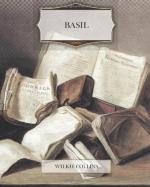“The very day of the marriage was fixed. I believed I had successfully parried all perilous inquiries—but I was wrong. A relation of the family, whom I had never seen, came to town a short time before the wedding. We disliked each other on our first introduction. He was a clever, resolute man of the world, and privately inquired about me to much better purpose in a few days, than his family had done in several months. Accident favoured him strangely, everything was discovered—literally everything—and I was contemptuously dismissed the house. Could a lady of respectability marry a man (no matter how worthy in her eyes) whose father had been hanged, whose mother had died in a madhouse, who had lived under assumed names, who had been driven from an excellent country neighbourhood, for cruelty to a harmless school-boy? Impossible!
“With this event, my long strife and struggle with the world ended.
“My eyes opened to a new view of life, and the purpose of life. My first aspirations to live up to my birth-right position, in spite of adversity and dishonour, to make my name sweet enough in men’s nostrils, to cleanse away the infamy on my father’s, were now no more. The ambition which—whether I was a hack-author, a travelling portrait-painter, or an usher at a school—had once whispered to me: low down as you are in dark, miry ways, you are on the path which leads upward to high places in the sunshine afar-off; you are not working to scrape together wealth for another man; you are independent, self-reliant, labouring in your own cause—the daring ambition which had once counselled thus, sank dead within me at last. The strong, stern spirit was beaten by spirits stronger and sterner yet—Infamy and Want.
“I wrote to a man of character and wealth; one of my friends of early days, who had ceased to hold communication with me, like other friends, but, unlike them, had given me up in genuine sorrow: I wrote, and asked him to meet me privately by night. I was too ragged to go to his house, too sensitive still (even if I had gone and had been admitted) to risk encountering people there, who either knew my father, or knew how he had died. I wished to speak to my former friend, unseen, and made the appointment accordingly. He kept it.
“When we met, I said to him:—I have a last favour to ask of you. When we parted years ago, I had high hopes and brave resolutions—both are worn out. I then believed that I could not only rise superior to my misfortune, but could make that very misfortune the motive of my rise. You told me I was too quick of temper, too morbidly sensitive about the slightest reference to my father’s death, too fierce and changeable under undeserved trial and disappointment. This might have been true then; but I am altered now: pride and ambition have been persecuted and starved out of me. An obscure, monotonous life, in which thought and spirit may be laid asleep, never to wake again, is the only




